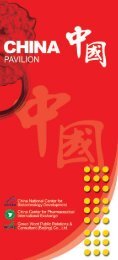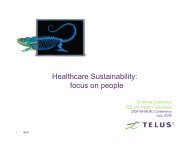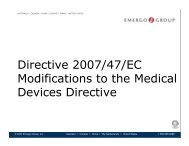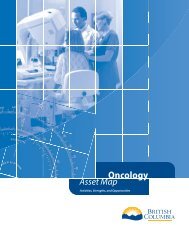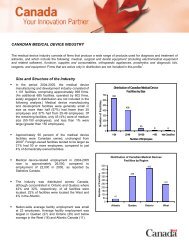Report - LifeSciences BC
Report - LifeSciences BC
Report - LifeSciences BC
- No tags were found...
You also want an ePaper? Increase the reach of your titles
YUMPU automatically turns print PDFs into web optimized ePapers that Google loves.
14formulary”; and<strong>BC</strong> should benchmark the cost, efficiencyand effectiveness of the PharmaCareinfrastructure against the performance ofother jurisdictions.The Canadian Diabetes Association's (theCDA) submission made many points similar innature to those expressed by the BPC but calledfor PharmaCare to be renewed throughlegislation that would include the followingcomponents:stronger transparency and accountability bygiving patients a role in formulary listingdecisions;increased patient access to all safe andeffective medications, devices and suppliesavailable for sale in Canada;removal of unnecessary paperwork fordoctors;increased roles for pharmacists and theirexpertise in medication therapy and chronicdisease care;inclusion of the relevant disease experts indecisions on disease specific listings;responsiveness to the views of BritishColumbians on the social aspects of drugpolicies and priorities; andachievement of the greatest savingspossible for <strong>BC</strong> taxpayers by counting allcosts and benefits across the <strong>BC</strong>healthcare system from increasing accessto safe and effective medications, devicesand supplies.Other groups who participated in the TaskForce process made recommendations thatwere focused on strengthening the recognitionof health and life sciences research as keydrivers of improved health outcomes. Thisview was strongly articulated by the seniorrepresentatives of the Vancouver CoastalHealth Authority (VCHA), Providence HealthCare (Providence) and Provincial HealthServices Authority (PHSA) research instituteswho called for the development of what theydescribed as a “healthier climate” forincreased engagement of pharmaceuticalresearch and investment in British Columbiaand the development of a culture of innovationoriented towards improved health outcomesfor patients. These research experts contendthat the historical, and current, approaches tolisting decisions in <strong>BC</strong> have been unreasonably15restrictive in this regard.14The high cost of generic drugs in British Columbia, and options to address this, is considered later in this report, (seepages 16-19). It should be observed, however, that some Task Force members were struck by how little attention thisarea of potentially substantial savings has received compared the province's Reference-Based Pricing program where thelevel of “savings” is relatively modest. (see: <strong>Report</strong> of the Reference Drug Program Consultation Panel to theHonourable Sindi Hawkins, Minister of Health Planning, British Columbia, April, 2002)15These research experts were particularly critical of what they regard as a narrow and restrictive approach used by theTherapeutics Initiative. They further suggest that the Therapeutics Initiative has been insulated from robust peer reviewexpected of academic organizations and from the rigours of competitive funding models.THE REPORT OF PHARMACEUTICAL POLICY RECOMMENDATIONS FOR THE MINISTRY OF HEALTH 8 APRIL, 2008





